Can Rice Noodles Go Bad? (And Can You Eat Expired Noodles?)
Rice noodles are a popular Asian-style noodle that is made from rice flour. You can use them in many dishes, such as stir-fries, soups, and salads. Rice noodles are a healthy alternative to wheat-based noodles, and they are gluten-free. They have a slightly sweet flavor and a chewy texture.
The question, however, is can rice noodles go bad?
Rice noodles are a dried food, so they have a long shelf life. If stored properly in a cool, dry place, they can last for two years. However, if they are exposed to moisture or humidity, they can start to spoil.
This post will answer that question in detail and give you some tips on storing rice noodles to stay fresh for as long as possible. So keep reading and learn all about rice noodles.
Do Rice Noodles Expire?
Yes, eventually, they will spoil.
However, rice noodles should last a long time before going bad if stored properly. When noodles start to spoil, they become discolored and develop a sour smell. If you notice either of these signs, it’s best to throw them out.
While noodles have an indefinite shelf life of up to a year, they should be stored in a cool, dry place. Once they are cooked, they can be stored in the fridge for five days. You can also freeze them for up to six months.
When cooked, rice noodles should be firm but not hard. If they are hard, they have gone bad and should be thrown out. If you are unsure if your noodles have gone bad, throw them out. Eating expired rice noodles can cause food poisoning.
In a nutshell, rice noodles do expire, but they have a long shelf life. Just be sure to store them properly and cook them before they go bad. And if you’re ever in doubt, it’s better to throw them out than risk food poisoning.
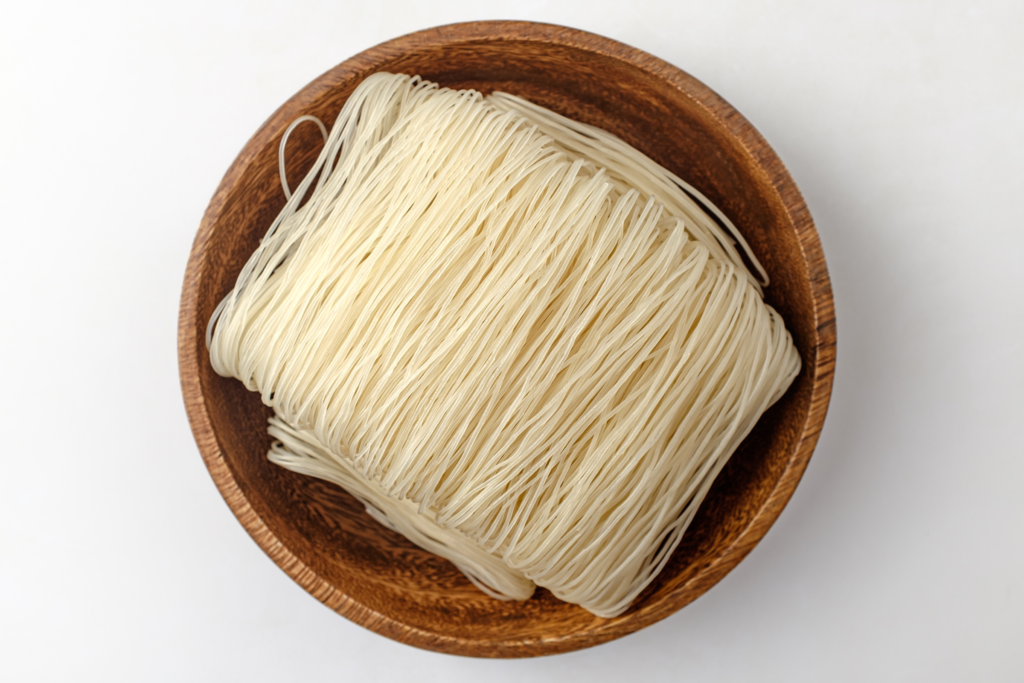
How To Tell If Rice Noodles Are Bad?
Now that you’ve known rice noodles do expire, how can you tell if your noodles have gone bad?
1. Check for Molds
Molds are one of the most common signs that food has gone bad. When it comes to rice noodles, molds can cause the noodles to change color, texture, and smell. If you see any mold on your rice noodles, it’s best to throw them out.
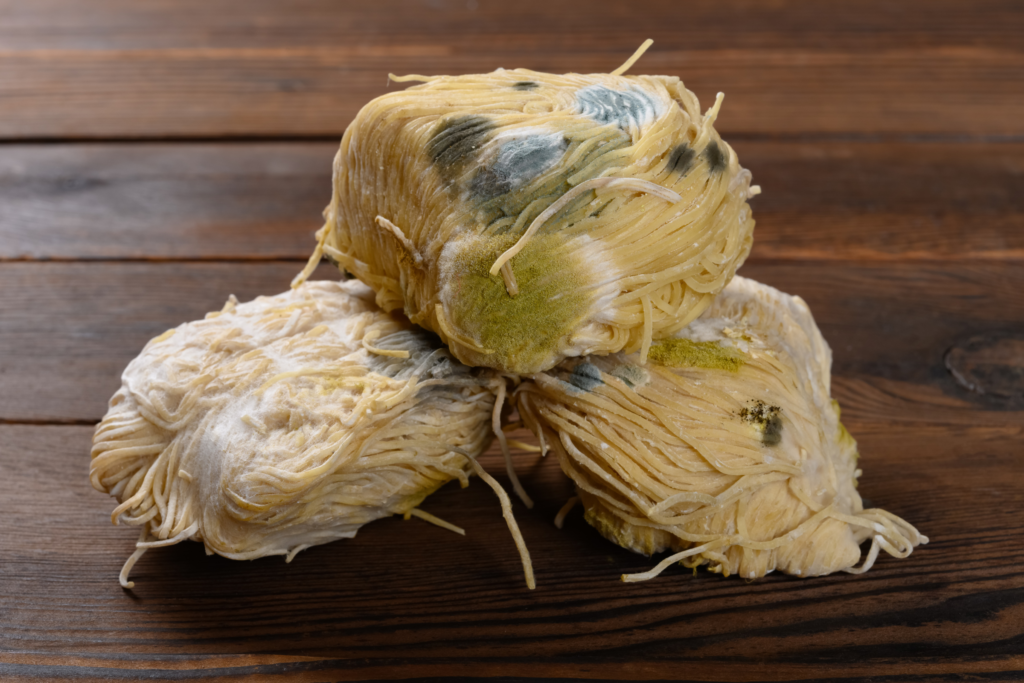
2. Smell the Noodles
Another sign that your rice noodles have gone bad is if they start to emit a bad smell. If the noodles smell sour or musty, it’s a good indication that they’re no longer safe to eat.
If you’re unsure whether or not your rice noodles have gone bad, dispose of them.
3. Observe for Changes in Color or Texture
If the rice noodles have changed color or texture, it’s another sign that they’re no longer suitable for consumption. For instance, if the noodles are discolored or have started to harden, they have probably gone rancid and should be thrown out.
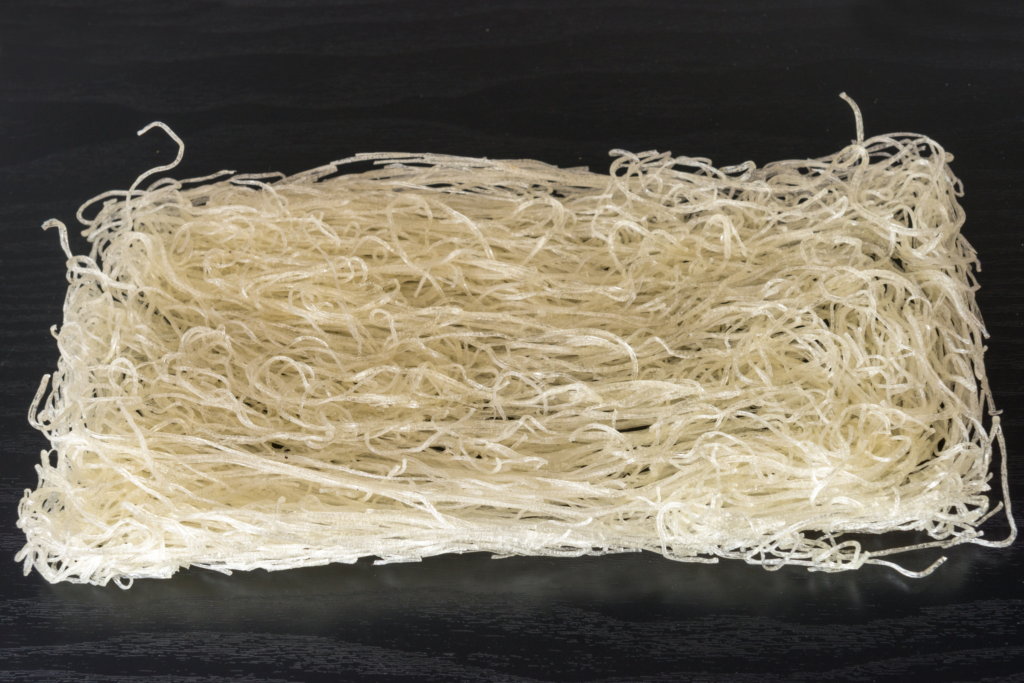
4. Taste the Noodles
If you’re still unsure whether or not your rice noodles have gone bad, try tasting them. If they taste sour or different from how they usually taste, it’s a good indication that they’re no longer safe to eat.
Note that this option isn’t recommended but will go a long way to tell the state of your rice noodles.
Can You Eat Expired Rice Noodles?
Yes, it’s okay to eat rice noodles past their expiration date. However, it’s important to note that the quality of the noodles will degrade over time. Additionally, expired rice noodles may not be as effective in absorbing flavors, so they may not taste as good as fresh noodles.
While rice noodles don’t go bad in the traditional sense, they will lose their quality over time. For the best flavor and texture, it’s best to use rice noodles within one year of their expiration date. After that, they may not taste as good and can be more challenging to cook.
You’ll also want to check for signs of spoilage before cooking or eating expired rice noodles. If the noodles are discolored, have an off odor, or are otherwise damaged, it’s best to discard them.
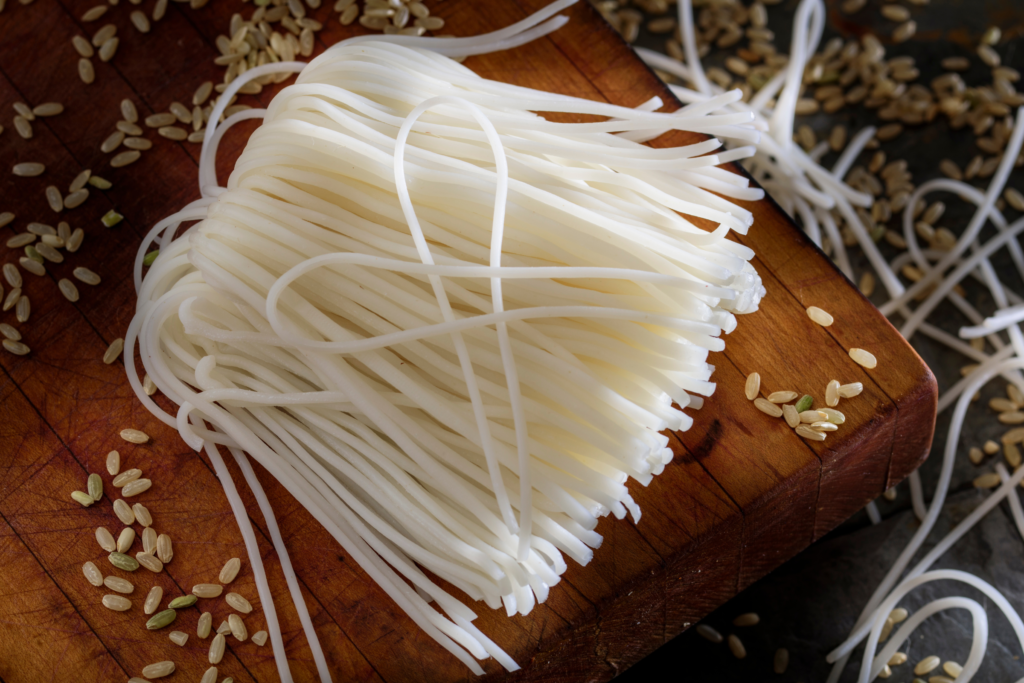
Can Old Rice Noodles Make You Sick?
Yes, eating old rice that has been stored improperly can cause food poisoning. Noodles contain Bacillus cereus bacteria, which can cause vomiting, diarrhea, nausea, and abdominal cramps. If you have eaten old rice noodles and are experiencing these symptoms, it is best to see a doctor.
If you have stored your rice noodles properly in a dry and airtight container, they should be safe to eat for up to two years. Beyond that, they may not taste as good, but they won’t make you sick.
Nevertheless, it’s best to discard rice noodles that are more than two years old to avoid the risks of food poisoning.
How Long Do Fresh Rice Noodles Last?
Fresh noodles will keep in the fridge for about 3 to 4 days. If you want them to last longer, you can freeze them for two months. When storing noodles, be sure to put them in an airtight container. This will help to keep them from drying out.
However, if you’re planning to consume your noodles the next day, there’s no need to put them in sealed containers as they will retain moisture.
Do note that cooked noodles have a shorter shelf life than uncooked ones. They can only be kept in the fridge for up to two days. If you want to extend their shelf life, you can freeze them for two months.
Can Rice Noodles Be Eaten Raw?
Yes, rice noodles can be eaten raw. However, if you are not used to eating them this way, it is best to cook them first. This is because raw rice noodles can be pretty chewy and hard to digest.
If you decide to eat them raw, soak them in water for at least 30 minutes. This will help to soften the noodles and make them easier to chew. You can also add a dressing or sauce to help with the flavor.
You should avoid eating raw noodles more often to avoid the risk of dietary deficiencies such as infections and intestinal damage. Cooking noodles will help to increase their nutrient availability and make them easier on your stomach.
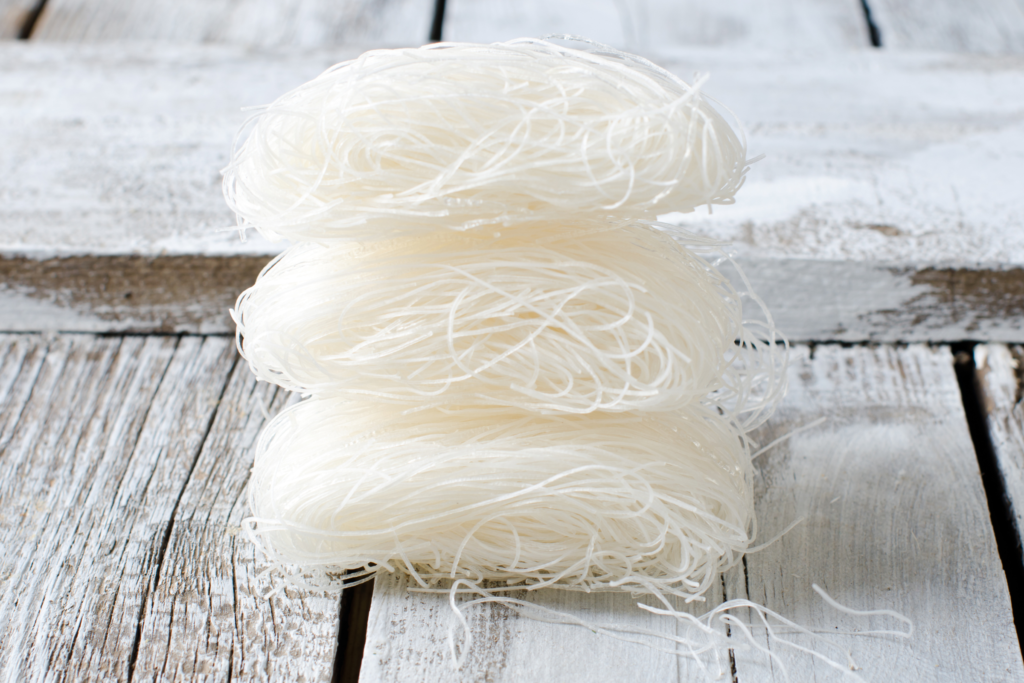
Can You Freeze Rice Noodles?
Yes, you can freeze rice noodles. However, you should cook them first. Drain any excess water, and let them cool completely before freezing. Frozen rice noodles will last for up to six months.
One important thing to note is that fresh uncooked rice noodles freeze well, but cooked rice noodles don’t. But if you’re looking to save some time, cook the noodles first, then freeze them. That way, you can just thaw and eat without cooking them again.
Let your rice noodles thaw overnight in the fridge before using them for optimum results. You can then reheat them in a pan over medium heat or microwave.
If you’re using them in a soup or stir-fry, there’s no need to thaw them first. Just add them straight from the freezer to the pot.
Can You Reheat Cooked Rice Noodles?
Yes, you can reheat rice noodles. To reheat, just put them in a pan of boiling water for a few minutes until they are piping hot all the way through. Alternatively, you can put them in a microwave-safe dish with a bit of water and reheat them on full power for two minutes.
Once they are heated through, drain any excess water and serve. You can store leftover rice noodles in the fridge for four days. Just put them in airtight containers to prevent your noodles from drying.
You’ll also want to ensure they’re adequately cooked before reheating them. Undercooked rice noodles can turn into a mushy mess or put you at risk of food poisoning.
To avoid this, cook them according to package instructions and drain them well. Rice noodles are an excellent option for busy weeknights—they cook quickly and can be easily reheated if you have leftovers.
Leftover rice noodles can last in the fridge for up to four days. Just be sure to store them properly and reheat them thoroughly before eating.
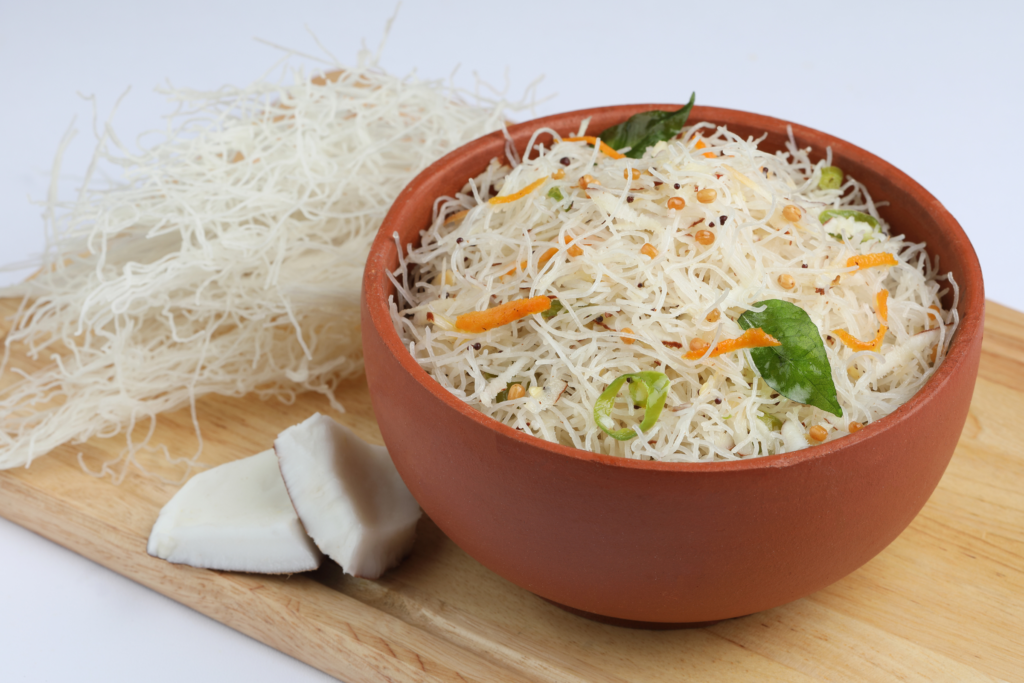
Frequently Asked Questions
1. Are Rice Noodles Healthy?
Yes, rice noodles are a healthy food choice. They are low in calories and fat and are a good source of carbohydrates and proteins. Rice noodles also contain various vitamins and minerals, including iron, potassium, and magnesium.
What’s more, rice noodles support digestion, blood sugar management, and healthy gut bacteria.
2. Can Bacillus Cereus Cause Death?
In rare cases, yes. If you think this bacterium has poisoned you, please seek medical attention immediately.
Bacillus cereus is a bacterium that can cause food poisoning. It is found in soil, dust, air, and even food, especially rice and noodles. The bacterium can cause vomiting and nausea, lasting six to 24 hours.
3. Do Dry Noodles Go Bad?
Yes, if they are not stored properly, they can go bad. It would be best to store dry noodles in an airtight container in a cool, dry place. If stored in a humid environment, they can develop mold or mildew.
You can keep unopened dry noodles in the pantry for a year. Once they are opened, you should use them within six months.
4. What’s The Difference Between Rice Noodles And Rice Sticks?
Rice noodles are made from rice flour and water, while rice sticks are made from rice flour, water, and tapioca starch. Additionally, rice noodles are more fragile with a lower gluten content than rice sticks. They also cook faster than rice sticks, but they can become mushy if overcooked.
Rice sticks are more resilient and have a higher gluten content, making them better suited for stir-frying. Finally, rice sticks take longer to cook than rice noodles, but they won’t turn mushy if you overcook them.
Conclusion
So, can rice noodles go bad? Yes, they can. If you don’t store them properly, they will deteriorate and become inedible. Keep your rice noodles in an airtight container and a cool, dry place to extend their shelf life.
Also, eat your rice pasta within a few days of opening the package for complete freshness. With proper care, you’ll enjoy your rice noodles for months without them losing texture or flavor.
Let Us Know How We’re Doing!
Did this expertly prepared resource answer your question?
Do you have another question about home maintenance, home improvement projects, home appliance repair, or something else?
Get more information, send in questions and keep the discussion going by contacting the I’ll Just Fix It Myself company customer service team at at 1-800-928-1490 or Email us at [email protected]
